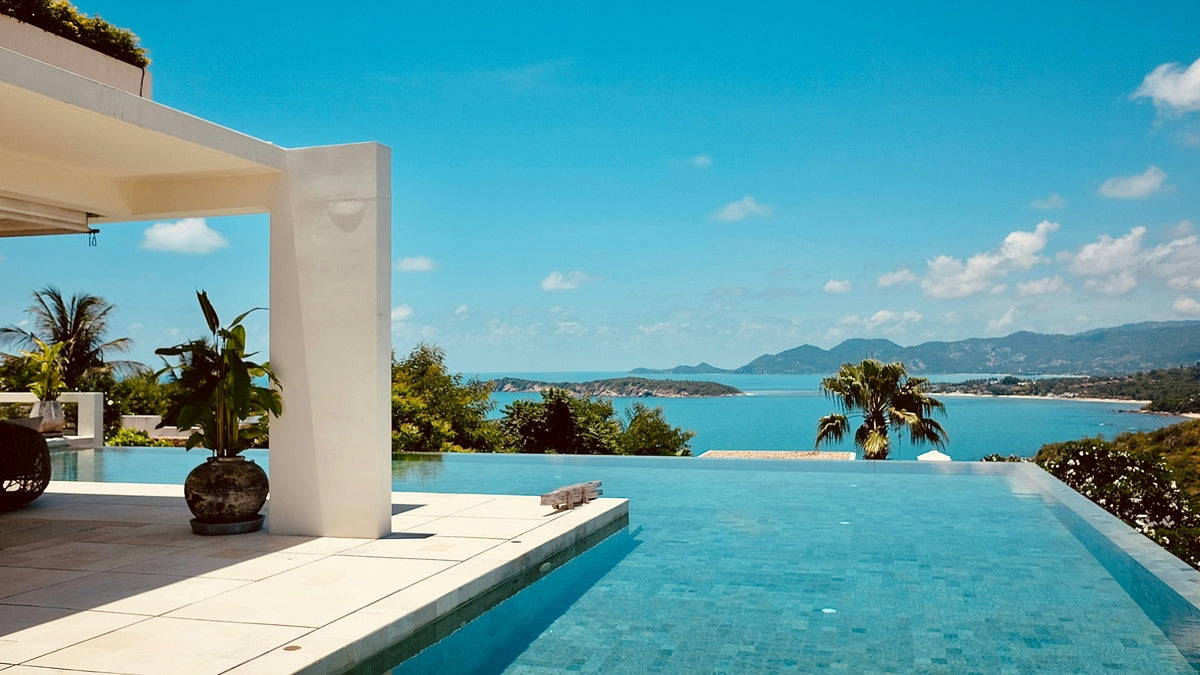
Understanding and Managing Cyanuric Acid Levels in Your Pool
|
|
Time to read 4 min
|
|
Time to read 4 min
It takes more than skimming leaves to ensure your pool stays in top-notch shape. You are adding chlorine. One crucial aspect of pool upkeep that often gets overlooked is managing the acid levels. Whether you're a pool owner or an experienced pro, having a solid understanding of cyanuric acid (CYA) can significantly impact your pool's cleanliness and health. Besides enhancing the effectiveness of chlorine, maintaining CYA levels can also extend the lifespan of your pool equipment and surfaces by reducing the need for excessive use of harsh chemicals. Let's delve into the world of cyanuric acid and discover why it's a vital component of your pool maintenance routine.
Cyanuric acid, also known as pool stabilizer or conditioner, is a compound that plays a crucial role in balancing your pool's water chemistry. From a chemical perspective, it's classified as a triazine compound. It forms a bond with chlorine, shielding it from degradation caused by the sun's UV rays. This protective action is key to maintaining stable chlorine levels, which is vital for ensuring a clean and safe swimming environment in your pool. In addition to stabilizing chlorine levels, CYA can also help reduce the amount of chlorine needed for treatment over time, leading to cost savings on pool maintenance expenses.
Cyanuric acid plays a role in maintaining the chlorine levels in your pool. When sunlight exposure breaks down chlorine, adding acid helps to stabilize it, making the chlorine last longer and work more effectively. Without acid, you would need to replenish chlorine frequently, resulting in higher expenses and increased maintenance efforts. Moreover, stabilized chlorine offers sanitization to prevent the growth of bacteria and algae in your pool.
Maintaining acid levels is essential for efficient pool upkeep. The recommended range for CYA concentration in pool water typically falls between 30 and 50 parts per million (ppm). However, for saltwater pools, the optimal range may be slightly higher, ranging from 60 to 80 ppm.
Low Cyanuric Acid Levels: Insufficient CYA levels can lead to chlorine degradation, making it challenging to uphold sanitization levels. This can result in increased chlorine consumption and higher maintenance costs.
Maintaining the right acid (CYA) levels in your pool is not just important, it's crucial for keeping the water clear and algae-free. Low CYA levels can hinder chlorine from consistently sanitizing the pool. On the other hand, high CYA levels can lead to chlorine lock, reducing its effectiveness in sanitizing the pool and potentially causing water that may require partial draining for correction. Moreover, excessive CYA creates an environment where harmful pathogens can thrive due to reduced chlorine efficacy, posing serious health risks to swimmers. It's clear that maintaining the right CYA levels is a key aspect of pool maintenance.
Regular testing is essential to ensure CYA levels are met. Methods such as test strips and liquid test kits are available to monitor CYA levels. Test strips are used by users who dip a strip into the pool water, observe the color change after a few seconds, and match it with the provided chart for a rough estimate of their CYA levels. Liquid test kits involve adding a reagent to a water sample and comparing the resulting color to a chart for measurements compared to test strips.
It's recommended to use liquid test kits when you need to make significant adjustments to your pool's chemical balance. It's best to check the acid levels in your pool once a month or more frequently if there's been heavy rainfall, frequent use, or if you've recently added new water. Regular testing helps maintain your pool and ensures that any issues with CYA levels are dealt with promptly. Remember, testing and adjusting your pool's CYA levels is a simple and empowering task that you can easily handle.
If your CYA levels are not within the recommended range, you can take steps to correct them.
Increasing Cyanuric Acid Levels: If your CYA levels are too low, you can use an acid product like a pool stabilizer or conditioner. Follow the manufacturer's instructions for the dosage based on your pool size. Adding the stabilizer evenly throughout the pool is essential to avoid localized concentrations that could impact water chemistry.
Decreasing Cyanuric Acid Levels: If your CYA levels are too high, one effective method is to drain and refill your pool with water. Alternatively, some products can help reduce CYA levels.
Regularly checking and adjusting your water balance is essential to prevent CYA levels from recurring.
In reality, an excessive amount of CYA can impede the effectiveness of chlorine. Elevated CYA levels may make it challenging to maintain sanitization, potentially leading to algae growth and other water quality concerns.
While CYA degrades slowly, significant decreases typically require dilution through water replacement. Understanding maintenance practices and dispelling these myths can help pool owners effectively manage their pools and avoid complications.
Maintaining acid levels is simplified with the use of specific products. Here are some suggested items from our store to assist you in pool management.
Check out our range of products to reduce CYA levels in your pool if they are too high. These specialized products can help you maintain the balance of your pool water, ensuring a swimming experience all season long. By using quality products, you can make pool maintenance easier and have peace of mind.
Managing cyanuric acid levels is essential for pool care. Keeping your CYA levels in check ensures that your chlorine works effectively, your pool stays clean, and swimmers remain safe. Remember to test, make adjustments as necessary, and opt for top-notch products to create a swimming environment. Regular maintenance not only prolongs the life of your pool but also guarantees a safe and enjoyable experience for everyone involved.